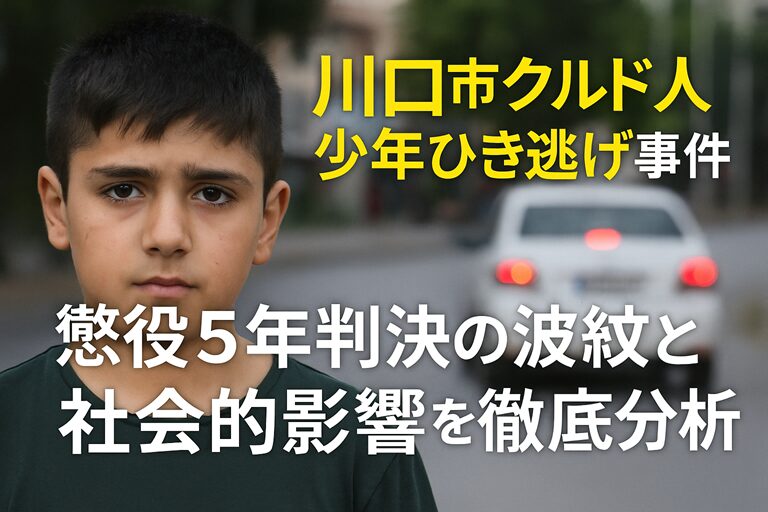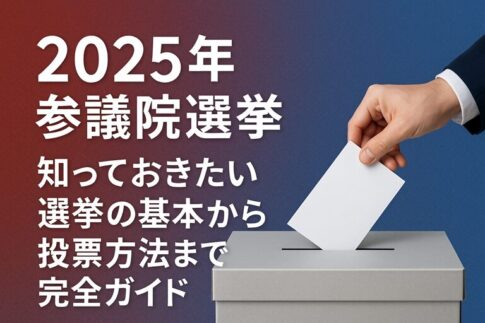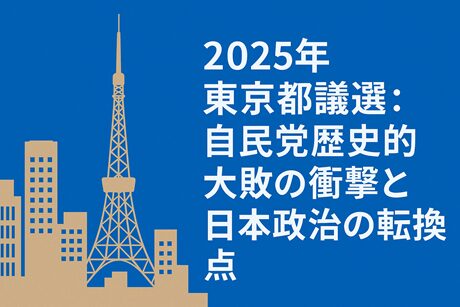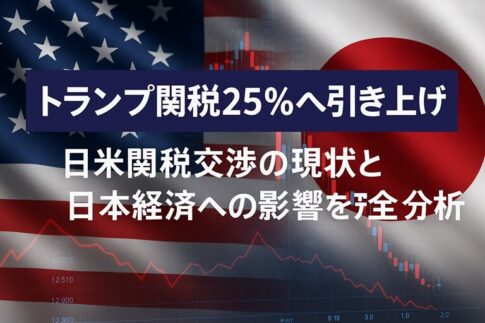目次
- 1 Japan’s Kurdish Problem: Fatal Hit-and-Run Exposes Issues
- 1.1 The Incident: 95km/h Reckless Driving Claims Young Lives
- 1.2 The 5-Year Sentence: Court’s Strict Stance
- 1.3 Kawaguchi’s “Kurdish Problem” Reality
- 1.4 “Fake Refugee” Issues and Economic Motives
- 1.5 Community Friction: Deepening Divides and Rising Anxiety
- 1.6 Administrative and Political Response: Temperature Gap Between National and Local
- 1.7 Public Reaction: Background of Anger and Distrust
- 1.8 Future Challenges and Prospects: Need for System Reform
- 1.9 Frequently Asked Questions (FAQ)
Japan’s Kurdish Problem: Fatal Hit-and-Run Exposes Issues
The Incident: 95km/h Reckless Driving Claims Young Lives
The tragedy occurred on September 23, 2023, at 11:35 PM at an intersection in Maekawa, Kawaguchi City. A 19-year-old Turkish national of Kurdish descent, driving without a license in a borrowed vehicle, was speeding at approximately 95 km/h on a road with a 30 km/h speed limit. He ran a red light and struck a motorcycle carrying two Japanese teenagers.
• Motorcycle driver (17, construction worker): Died early the next morning
• Passenger (16, high school student): Remained in a coma for over 10 months
The perpetrator’s actions after the accident further aggravated the situation. He fled the scene, leaving almost no brake marks, and later contacted relatives asking them to take responsibility for the accident. These attempts to evade accountability became a crucial factor in the court’s harsh judgment.
The 5-Year Sentence: Court’s Strict Stance
On July 17, 2024, Judge Kenichi Emi of the Saitama District Court sentenced the defendant to 5 years in prison (prosecutors had sought 7 years). The verdict reflected several considerations.
Four Reasons the Sentence Wasn’t Reduced
- Reckless driving causing severe negligence: The 95 km/h speed and red light violation created an unpredictably dangerous situation
- Abandonment of rescue duties: Fleeing without returning to help victims
- Attempts to evade responsibility: Asking relatives to take the blame, attempting to conceal the crime
- Lack of victim compensation: No insurance coverage, leaving victims without compensation
Throughout the trial, the defendant kept his head down, showing no apparent remorse. The victims’ families stated there had been “not a single apology,” expressing strong demands for punishment.
Kawaguchi’s “Kurdish Problem” Reality
This incident has brought renewed attention to social issues centered in Kawaguchi City. The city hosts approximately 2,000-3,000 Turkish nationals, most of whom are Kurds.
The “Kurd Car” Problem: Dangerous Driving Threatening Residents
Vehicles known as “Kurd Cars” among local residents have become a source of concern. There are two types:
1. Overloaded trucks: Trucks carrying demolition waste that protrudes from the cargo bed, driven by Kurds in the demolition industry
2. Illegally modified cars: Old domestic sedans modified to produce loud exhaust noise late at night
These vehicles are observed speeding through narrow residential streets and school zones, ignoring traffic signals and driving under the influence. Social media posts documenting dangerous driving have increased residents’ anxiety.
Provisional Release System Contradictions: The Reality of Being Unable to Work but Needing to Live
Many Kurds apply for refugee status citing persecution in Turkey, but Japan’s refugee recognition rate is extremely low, leaving most in “provisional release” status. This system contains serious contradictions:
- Employment is prohibited in principle
- Cannot enroll in national health insurance
- Yet many work illegally in demolition or cleaning industries
- Some cases of provisional release lasting 10-20 years
Part of this is believed to be related to unpaid medical expenses by provisional release holders.
July 2023 Hospital Disturbance: 100 People Gather in Shock
In July 2023, a knife incident between Kurds occurred in Kawaguchi City. About 100 Kurds from both sides’ families and associates gathered near Kawaguchi City Medical Center where the injured were transported. They tried to force open the emergency entrance and fights broke out between opposing groups. This forced the medical center to suspend ambulance admissions for about 5.5 hours.
“Fake Refugee” Issues and Economic Motives
A 2004 Ministry of Justice Immigration Bureau “Turkey Field Investigation Report” found that refugee applicants’ hometowns were concentrated in specific “migrant worker villages,” concluding that “economic migration” was the main reason for coming to Japan.
In May 2025, Representative Taro Kono stated on his blog that “many Kurds are fake refugees for economic purposes” and strongly urged the Ministry of Foreign Affairs to suspend visa exemptions for Turkish nationals, causing significant controversy.
Community Friction: Deepening Divides and Rising Anxiety
Daily Life Friction Reality
- Habitual violations of garbage disposal rules
- Loud voices and group behavior at parks and convenience stores at night
- Increasing complaints about living noise
- Sexual assault incidents and dissatisfaction with non-prosecution decisions
Particularly serious are cases where a 20-year-old Kurdish man sexually assaulted a teenage middle school girl, and another 20-year-old Turkish national was arrested on suspicion of sexually assaulting a 12-year-old girl, both resulting in non-prosecution. City council members have voiced concerns that “Japanese people’s safety is not guaranteed” and “it’s terrifying.”
Deteriorating Perceived Safety: Gap Between Statistics and Resident Feelings
Police statistics show that reported crimes in Kawaguchi City have been declining over the past 10 years. However, many residents feel “the city has become dangerous,” and this deterioration in “perceived safety” is a serious issue.
• Anxiety about people who don’t speak Japanese
• Presence of foreigners gathering in groups
• Nighttime noise and reckless vehicles
• Uncooperative attitudes after incidents/accidents
Administrative and Political Response: Temperature Gap Between National and Local
Kawaguchi City’s Unprecedented Request
In 2023, Kawaguchi City submitted an unprecedented request to the national government seeking three points:
- Strict legal action (including deportation) against foreigners who commit illegal acts
- Establish limited work permit system so provisional release holders can maintain minimum living standards
- Consider national responsibility for support accessing administrative services like medical care and education
Mayor Nobuo Okunoki expressed strong dissatisfaction: “The national government doesn’t even know the number of provisional release holders. They just push everything onto local governments without fulfilling their accountability.”
National-Level Discussion
The LDP’s special committee is considering reviewing the entire foreign resident acceptance system. Major items under consideration include:
- Stricter refugee recognition system and expedited screening
- Strengthened restrictions on foreign license conversion system
- Introduction of “supervision measures” for provisional release holders and enhanced residence management
- Improved effectiveness of deportation processes
Public Reaction: Background of Anger and Distrust
Yahoo! Real-time Search trends showed words like “This is wrong!” “Two Japanese people” “Japan hate” “Foreigner favoritism,” indicating strong emotional reactions.
Voices from X (Twitter) Users
Social media reactions to the incident reveal complex emotions about Japan’s foreigner issues.
• “Nothing but death penalty is acceptable”
• “At least 20 years, or add up crimes for 100+ years”
• “Too lenient. Victims have no choice but to accept it”
• “Frustrating as a Japanese person”
Particularly strong is the anger that victims cannot expect compensation due to the uninsured, unlicensed driving. Many voices say “Two Japanese lives were taken, this level of punishment is unacceptable.”
Distrust in the Judicial System
The particular issue is the succession of non-prosecution decisions for crimes by foreigners. While reasons for non-prosecution are often not disclosed, with “diplomatic considerations” or “insufficient evidence” suggested as backgrounds, citizens’ anxiety remains unresolved.
• “Immediate deportation is appropriate”
• “Why can they be arrested 4-5 times for the same crime?”
• “Foreign crime, Japan’s laws are too strange”
• “Do they prioritize foreigners’ human rights over Japanese safety?”
These voices raise fundamental questions about whether Japan’s legal system is dysfunctional regarding foreign crime.
Anger Over “Foreigner Favoritism”
On X, keywords like “foreigner favoritism” and “Japan hate” are frequently used, expressing strong dissatisfaction with the current system.
• “Foreigners are more protected. Don’t Japanese matter?”
• “Stop the Japan hate policies”
• “Are foreigners’ human rights more important than Japanese lives?”
• “While tax-paying Japanese are suffering”
These voices reflect a sense of “unfairness” arising from multiple overlapping issues including unpaid medical expenses by provisional release holders, frequent non-prosecutions, and lack of victim compensation. The existence of over 74 million yen in uncollected fees at Kawaguchi City Hospital particularly amplifies taxpayers’ anger.
Criticism of Media Coverage
Media coverage attitudes also face severe criticism on X.
• “Why report only ‘Turkish nationality’ and not say ‘Kurdish’?”
• “Biased media that won’t report correctly”
• “Can’t forgive the foreigner-favoring coverage attitude”
• “Japanese are victims, but they only protect perpetrators’ human rights?”
Particularly strong is distrust over not clearly reporting perpetrators’ ethnic backgrounds, creating suspicions of “hiding the truth.” Meanwhile, there are also points about the “temperature difference” where incidents by US military personnel aren’t nationally reported, problematizing media’s selective coverage attitudes.
Future Challenges and Prospects: Need for System Reform
The Kawaguchi City case symbolizes structural problems in Japan’s immigration policy. With the system creating a vacuum between “coexistence” and “deportation,” the burden is concentrated on local governments and residents.
Direction of Required System Reforms
- Expedited refugee screening: Complete screening within 3 months with immediate processing after determination
- Clarification of provisional release holders’ legal status: Mandatory supervision measures and conditional work permits
- Strengthened support for local governments: National funding and human resource deployment
- Improved deportation effectiveness: Enhanced deportation processes including charter flight utilization
This issue is not unique to Kawaguchi City. As dependence on foreign workers increases in a declining population society, the contradiction with social systems not designed for long-term foreign residents may face many municipalities. Rather than emotional arguments, calm discussion based on data and legal procedures, and effective system reform are urgently needed.











Leave a Reply